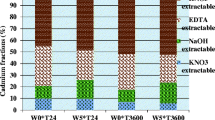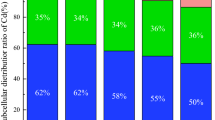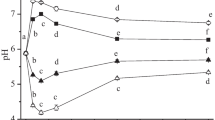Abstract
Background, Aim and Scope
Humic acids (HAs) are the most important humified component of dissolved organic carbon (DOC) present in sewage water used for irrigation. It is well known that HAs affect the toxicity and availability of heavy metals (HMs) in soil-plant systems, and may increase the human exposure to HMs in contaminated soil through plant uptake. This study was conducted to assess the effects of HAs on HM availability, plant growth and HM uptake. Materials and Methods: With wheat (Triticum aestivum) as a test plant, a greenhouse pot experiment was conducted to investigate the effects of HAs in irrigation water on the phytoavailability of cadmium (Cd) and lead (Pb) in soil. Cd and Pb were added to the soil at concentrations of 1.5 and 150 mg/kg, respectively. Wheat seedlings grown in Cd and Pb-contaminated soil were watered with 4 levels of HA solution (0, 140, 280 and 560 mg/kg of HAs, respectively). Results: In control and Pb treatments, both plant biomass and plant HM concentrations increased with increasing concentrations of HAs in the solution. Plant biomass was markedly decreased when metal concentrations in plants increased, particularly in Cd and Cd/Pb treatments. In the soil, extractable metals, and water soluble organic carbon (WSOC) and its fractions significantly increased with increasing HA concentrations. Discussion: The results suggested that the application of HAs in barren soils may improve plant nutrition by mobilizing soil nutrients and providing plants with carbon sources. On the other hand, HAs present in sewage water may increase both the availability and transfer of HMs in the soil-plant continuum and subsequently increase human exposure to HMs in polluted soil. Conclusions. Conclusions: HA solution as irrigation water significantly increased HM availability to plants cultivated in the HM-amended soil and may increase the environmental risk of sewage irrigation. Recommendations and Perspectives: These results suggested that, when assessing the effect of sewage irrigation on soil quality, HAs contained in sewage water should be taken into consideration.
Similar content being viewed by others
Author information
Authors and Affiliations
Corresponding authors
Rights and permissions
About this article
Cite this article
Chen, B., Zhu, YG. Humic Acids Increase the Phytoavailability of Cd and Pb to Wheat Plants Cultivated in Freshly Spiked, Contaminated Soil (7 pp). J Soils Sediments 6, 236–242 (2006). https://doi.org/10.1065/jss2006.08.178
Received:
Accepted:
Published:
Issue Date:
DOI: https://doi.org/10.1065/jss2006.08.178




